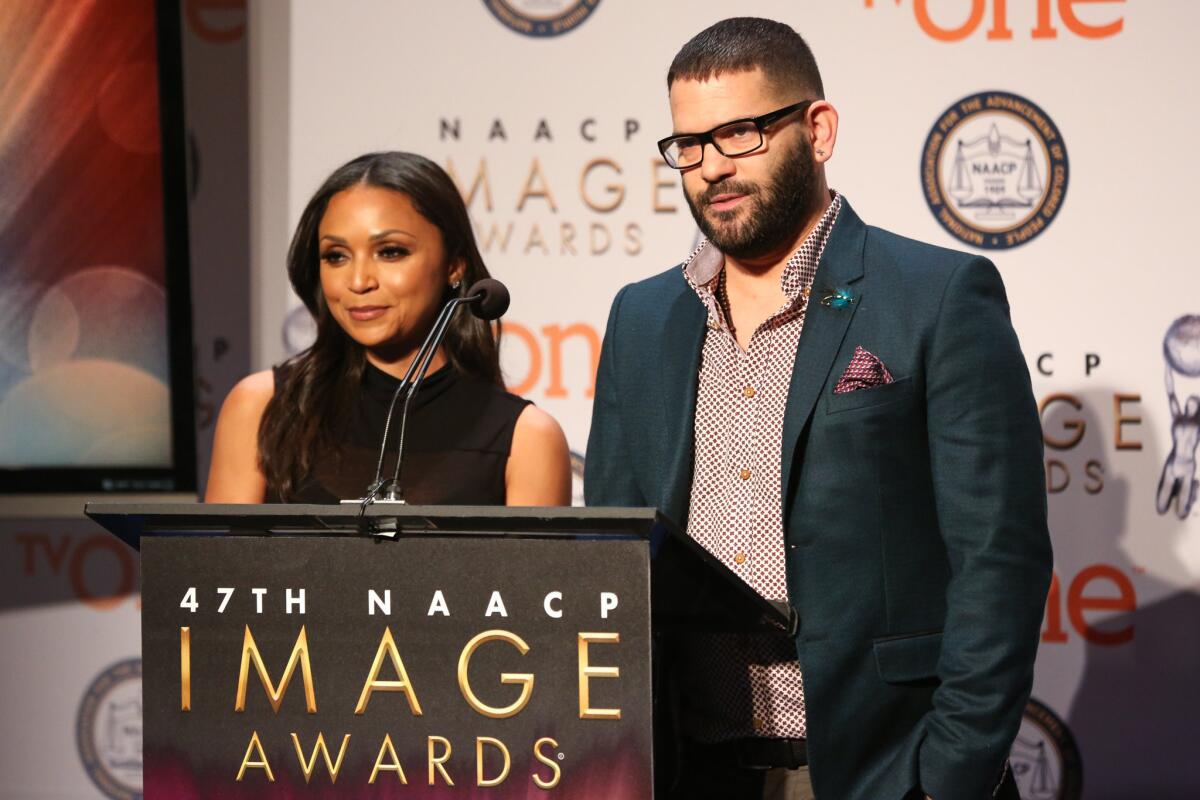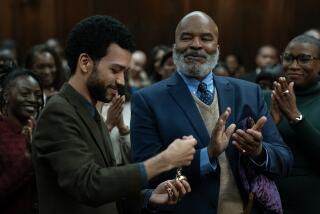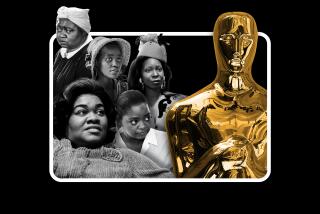Black award shows are important, but ‘we can’t uncement the many years of the “gold standard” ’

Danielle Nicolet and Guillermo Diaz speak at the 47th NAACP Image Awards nomination announcement and press conference in December at the Paley Center for Media in Beverly Hills.
Following outrage over the mostly white list of Oscar nominees, black people find themselves wrestling with a question posed by James Baldwin in his 1963 book “The Fire Next Time”: “Do I really want to be integrated into a burning house?” In this case, the burning house is an entertainment industry that makes money off the labor of people of color, but seemingly refuses to value them otherwise.
The answer depends on whom you ask, but some are supporting efforts to uplift celebrations like the NAACP Image Awards, airing live on TV One on Friday night, or the American Latino Media Arts Awards. They see these award shows as the necessary, inclusive alternative to the Academy Awards.
#OscarsSoWhite: The boycott, reaction and more
“You don’t have to force anyone to do anything they don’t want to do. And, at a certain point, you simply have to accept that perhaps they’re not doing it because they don’t really want to do it,” said Gil Robertson, president of the African American Film Critics Assn. “If you’re waiting for someone else to give you a cold cup of water, you might just go thirsty.”
The belief goes that reform, as committed to by the Academy of Motion Picture Arts and Sciences, means little in the conversation about diversity in Hollywood, Robertson said. In addition to increasing representation of marginalized communities, true change comes when the value with which people of color are regarded is equal to their white counterparts. Minority-focused celebrations directly confront this.
One such example, on a small scale, are the awards to be presented by the African American Film Critics Assn. on Wednesday. The organization’s top 10 films of 2015 include black-led pictures “Straight Outta Compton,” “Creed” and “Beasts of No Nation” and mostly white productions like “The Danish Girl,” “Carol” and “The Martian.”
“Our show recognizes diversity and inclusion,” Robertson said, noting past honorees and winners J.K. Simmons, Felicity Huffman, Heath Ledger and Angelina Jolie. “It’s a big part of what we do.”
On a larger scale, televised shows like those from the NAACP or BET are offered as other examples of spaces where minority talent is valued in addition to that of white people.
At the BET Awards, artists including Sam Smith, Iggy Azalea, Eminem and Justin Bieber have been nominated or won. The same goes for the NAACP Image Awards, where this year’s nominees include Gina Rodriguez, Guillermo Diaz, Hudson Yang and Jill Soloway.
The necessity of award celebrations where everyone is valued and people of color are uplifted cannot be understated, said director and actress Debbie Allen.
“We’re saying, from this point of view, this is what’s important to us,” she said. “We’re telling them: ‘These are the books we want to read, the shows we want to see, the people behind the scenes working and doing something that maybe you need to know about.’”
Calls to reject the academy’s importance and undoubtable box office influence, however, are shortsighted, according to Stephane Dunn, director of the Cinema, Technology and Emerging Media Studies program at Morehouse College. Despite critique, “we can’t uncement the many years of the ‘gold standard,’ the ultimate sign in Hollywood,” she said.
“I think within the African American community, just like in the Latino community, there are major awards that we really respect, that we see Taraji [P. Henson] or Denzel [Washington] coming out faithfully when they receive those awards and get that love. But culturally, overall, these awards have not had the same level of influence in terms of one’s career, necessarily, as the academy. They are not cemented in mainstream American culture in the way the Oscars are.”
If the hope is to further distribute the acclaim with which the Academy Awards is regarded among other platforms that recognize and value the vastness of worthy productions by people of color, Dunn advises a re-evaluation of things considered award-worthy.
“To put some distance between us and the devaluation that the Oscars does as it continues to ignore us, let’s take seriously productions of those of color and make the standards high,” she said.
As the conversation continues to unfold, April Reign, creator of the hashtag #OscarsSoWhite, believes there are ways to invest in alternatives where minorities and marginalized groups are uplifted while simultaneously holding the academy and broader Hollywood accountable.
“I think the NAACP Image Awards and the ALMA Awards and the BET Awards are incredibly important and grew out of the need to have a space where we can celebrate ourselves and each other because we weren’t getting that from the academy and Grammys,” she said. “But I don’t think they have to be mutually exclusive. We can call out the academy and say things must change while at the same time supporting those organizations and award shows that do focus on people of color and marginalized communities.”
Still, Robertson encourages minorities to look within themselves for the recognition they deserve.
“That’s where the conversation needs to be, not about what someone has done to us, but what can we do for ourselves,” he said. “Stop looking for validation across town and start validating yourself.”
Get your life! Follow me on Twitter: @TrevellAnderson.
Get more entertainment news on Facebook
More to Read
Only good movies
Get the Indie Focus newsletter, Mark Olsen's weekly guide to the world of cinema.
You may occasionally receive promotional content from the Los Angeles Times.







